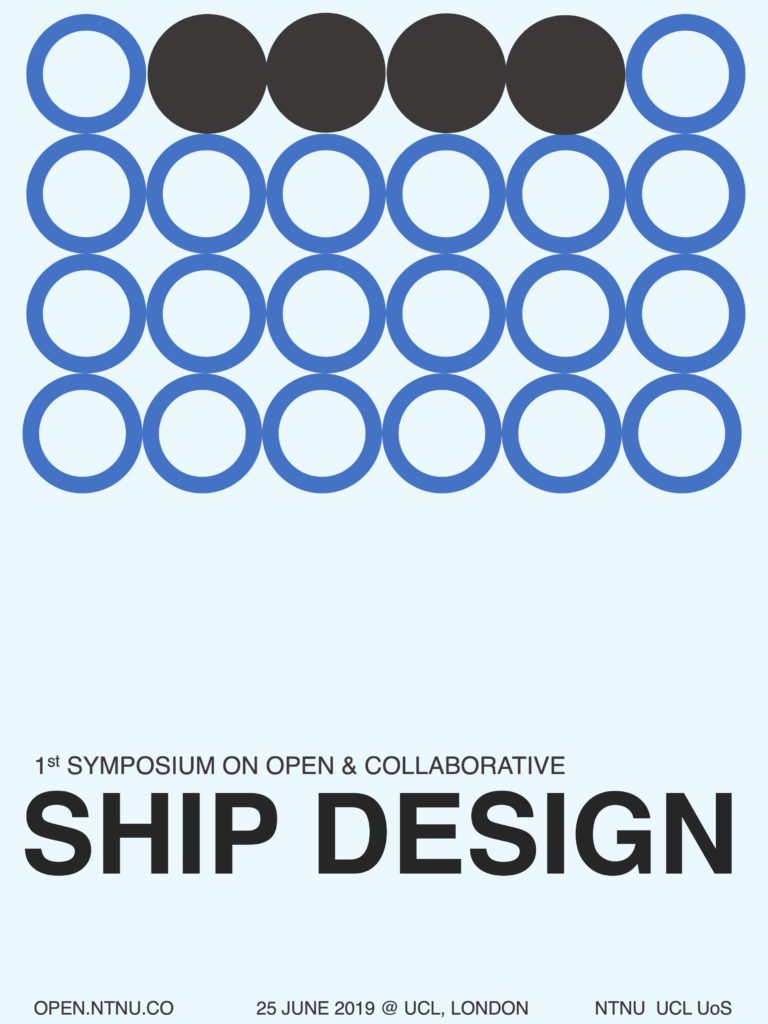Preliminary Agenda (June 25th, Tuesday):
Local: UCL – Robert’s Building – 5th Floor – room 503C – Register in the entrance (visiting Prof. Giles Thomas)
10:00 – Opening
10:15 – 11:15 Open Ship Design
- What are the barriers for having open ship design? How can we break these down?
- Open Data – how to collect, filter, store and access ship data in education, research and industry?
- Research: how to make methods and results reproducible and available?
- Open vs Free – licensing (VR Unity case)
- Industry: How to deal with confidential data?
- The MS Office Trap: why 99% all we use come from Excel, PowerPoint or Word, requiring an individual parsing. How to avoid it?
- GitHub Experience – why we should be using this? Pros and Cons.
11:15 – 11:30 Coffee Break
11:30 – 12:30 Collaborative Ship Design
- How to develop results/research towards easy students and peers re-use?
- How to share ship design information (e.g. processed data) in the academia and industry?
- USB Stick / E-mail / Google Drive / Dropbox / GitHub cases – pros and cons for collaboration.
- How Industry collaborates? Fast-Trak example (Ulstein Group)
- Why we don’t have a e-library of ship designs available for everyone? Nissan Case
12:30 – 13:30 Lunch
13:30 – 14:30 Technology Talk
- What is current toolbox for researchers in Ship Design?
- Why commercial software clashes with academia and how to avoid it?
- Open development from scratch (Python / Javascript / Processing)
- Open analysis software (Open Foam?)
- How industry can collaborate from non-commercial technology?
- Online examples
- Can we re-use what is already available? (UCL / NTNU / UoS examples and discussion)
14:30 – 14:45 – Coffee Break
14:45 – 15:45 – Imagine the future – Hopes and Fears
- How to foster openness and collaboration in ship design?
- What should we expect for the future?
- Best and Worst case scenario for praising open and collaborative approaches.¨
- How industry can benefit from the idea of open and collaborative?
- Will industry really be “open and collaborative” (DNV/Kongsberg case)
- Does it makes sense for having the Github effort – share the data and methods besides the paper?
15:45 – 16:15 – Wrap Up and Closing
About
This informal meeting gathers people working on the topic of open and collaborative technology applied to ship design, such as JavaScript, processing, python, notebooks, unity and vr.
The meeting is organised by NTNU (Henrique Gaspar), UCL (Giles Thomas) and Univ. of Southampton (Gabriel Weymouth).
If you wish to participate, please let us know asap sending an e-mail. Places are limited to the room capacity. A more detailed program of the event will be posted online closer to the date.
F.A.Q.
Q.: What you mean by open and collaborative in ship design?
A.: Open: a piece of knowledge that the original code/algorithm/formula/process/method is made freely available and may be redistributed and modified. Collaborative: the process of developing this piece in a way that facilitate peers to re-use, contribute, and develop further. Pretty much the idea of an academia, but for everyone and here applied to ship design problems.
Q: Is this a conference?
A: Symposium is a fancy word that stays in between a seminar (which is usually an one-institution event) and a conference (a more fancy and formal multi-country / institution event). Our meeting is in something in the middle – it is international (Norway and UK) but we want to make it small, informal and direct to the point.
Q: Do I need to write/submit a paper? Will it be indexed?
A: No. No. The objective is to discuss on-going projects on open and collaborative ship design. The show off will be more on online examples rather than formal papers.
Q: What to expect then?
A.: You can have a glimpse of what to expect checking these amazing open and online examples:
NTNU – https://shiplab.github.io/vesseljs/
UoS – https://github.com/weymouth/MarineHydro
UCL – http://cr.ucl.im/dataVis/
Q: I have my project and want to present it. Can/Should I?
A.: Was it developed open and collaboratively? Can you share a github page, for instance? Do you know how to commit to github, by the way? If yes, you should. If not, you should come to listen and check how to develop open next time.
Q.: But it is a fancy Excel / Matlab / Nastran / Paramarine / MaxSurf / StarCCM+ parametric tool, I spent hours on it, it’s amazing!
A.: Nope. If it requires a paid software to edit and maintain the file it is not open and probably have a low level of collaboration.
Q.: But it is fast, and solves the problem so well. Everyone that I show loves it.
A.: Good for you. There’s 100s of conferences and seminars to show it, just not here.
Q.: How formal is it? How much time beforehand should I register?
A.: Pretty informal, but with very limited places in the room. If you are willing to come, reply this e-mail asap. If we get more demand than the offer of places we make sure to be more formal, and you get another individual e-mail from us asking “Are you REALLY coming?”.
Q.: So who is coming?
A.: Confirmed so far Henrique Gaspar (NTNU), Giles Thomas (UCL) and Gabe Weymoth (UoS), plus the researchers and students that work directly with us.
Q: Where is the program? How long will it take?
A.: We will publish in the website one week before the even. But expect something from 9 to 5, with lunch included, on the June 25th.
Cool poster to share: (.pdf, .png, .jpg):

